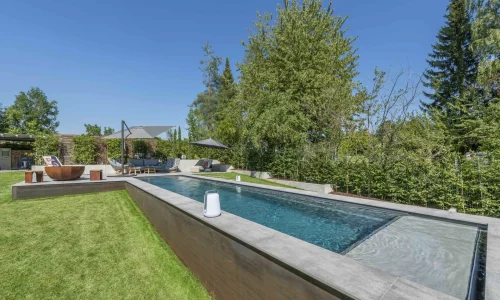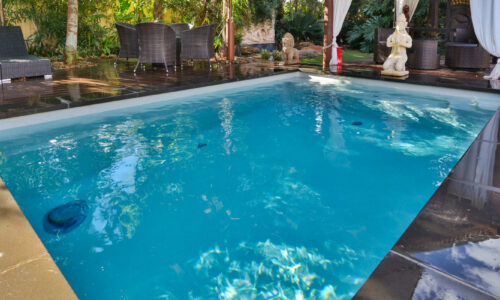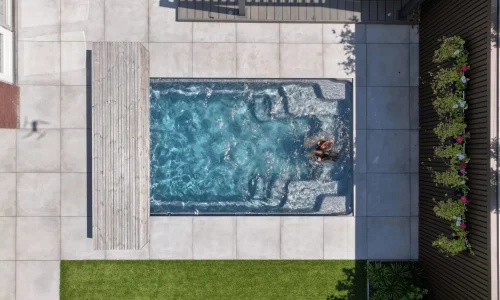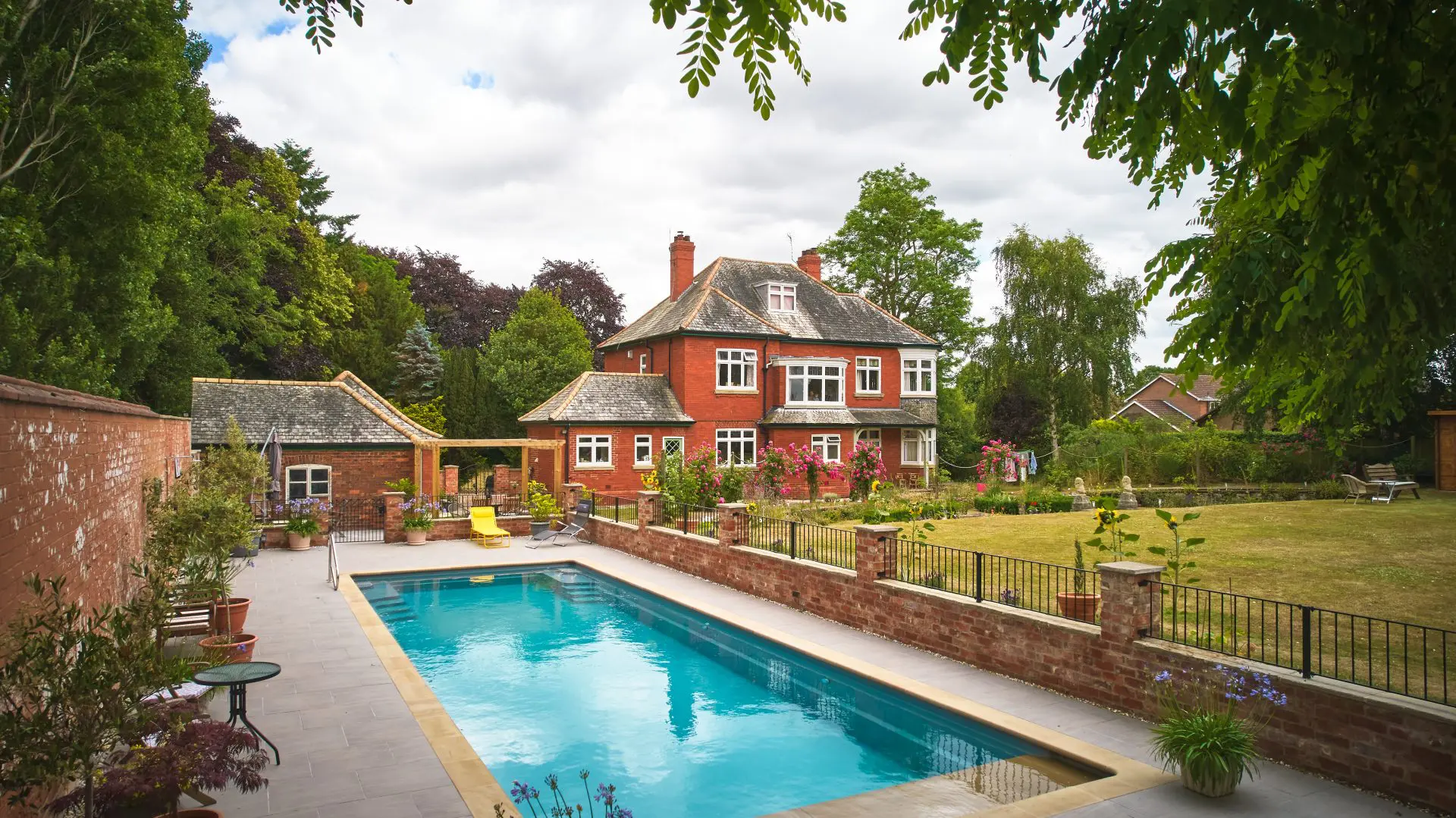
Complete Guide to Swimming Pool Types
Outdoor Pools
Outdoor pools are one the most traditional and popular types of swimming pool installation, designed specifically for external spaces such as gardens or patios. An outdoor pool is exposed to the elements and a variety of weather conditions throughout the seasons, which makes them particularly appealing to those who enjoy swimming in fresh air and with natural light.
Another benefit of this style of pool is that it offers more size flexibility than indoor alternatives, since space constraints are less of a concern. This allows for larger installations that can accommodate more people, so they’re great for families. The main advantage of outdoor pools is in their integration with natural surroundings and outdoor entertainment areas. They can be seamlessly incorporated into existing landscaping designs, creating beautiful focal points that enhance your property’s look and value.
However, outdoor pools do present certain challenges that potential owners should consider. Weather can affect their usability, particularly in regions with distinct seasonal changes, and pools might require winterisation and seasonal maintenance. Safety is also a priority, meaning your pool may require fencing or covers if you have pets or little ones running around. Despite this, outdoor pools remain ideal for homeowners with adequate outdoor space who want traditional swimming experiences and enjoy outdoor recreational activities.

Indoor Pools
Indoor pools are, as the name suggests, installed inside buildings, offering year-round functionality regardless of external weather conditions. These sophisticated installations require careful engineering to address climate control, ventilation and humidity management, ensuring comfortable swimming conditions while also protecting the structure of the building from moisture-related damage.
Indoor pools are usually smaller than outdoor models due to spatial constraints within existing or purpose-built structures, but they compensate for this with enhanced privacy, security, and greater control over environmental conditions. This means you can enjoy year-round use of your pool, while controlled lighting allows for customised ambiance that can enhance the swimming experience during different times of day.
Due to the complex construction and operational considerations, indoor pools come with a higher cost to reflect the need for professional design, specialised ventilation systems, humidity control equipment, and structural modifications to accommodate the pool and its supporting systems. Indoor pools are best suited for anyone seeking year-round swimming capability, enhanced privacy, or those living in climates with extreme weather conditions that make outdoor pools impractical for large parts of the year.

Swim Spas
An innovative combination of swimming pool and hot tub, installed in a compact, self-contained unit, swim spas are designed primarily for exercise and therapeutic relaxation. They typically range from 12 to 20 feet in length and feature powerful jet current systems that allow users to swim in place against adjustable water flows. Many models offer dual-zone configurations with separate areas optimised for swimming exercise and spa relaxation, providing maximum versatility in one space-efficient design.
There are some potential limitations of swim spas. These include restricted space for multiple users at the same time, and limited recreational swimming area compared to traditional pools. The current generation systems also require regular maintenance and can produce operational noise that might be noticeable in quieter environments.
This style of pool, since it’s often installed indoors, offers year-round usability with integrated heating systems that provide consistent access to exercise and hydrotherapy regardless of seasonal conditions. Installation is also typically faster and less complex than a traditional pool construction. Swim spas are best suited to fitness enthusiasts who want to prioritise their exercise capability, or for homeowners who have space limitations to think about.

Inground Hot Tubs
Inground hot tubs are permanent spa installations built below ground level. While they’re often integrated into larger swimming pool systems, they can also be installed as standalone luxury features. These therapeutic pools maintain water temperatures typically between 35-40oC and accommodate anywhere from two to twelve people depending on size and configuration. Advanced filtration, heating, and jet systems provide therapeutic massage and relaxation benefits while sophisticated engineering ensures proper water circulation and temperature control.
The therapeutic benefits of warm water combined with targeted jet massage provide relief for joint pain, muscle tension, and stress, while also promoting improved circulation and relaxation. When added to existing pool systems, inground hot tubs can share filtration and heating equipment, creating operational efficiencies and reducing overall system complexity.
Once installed, the location of your pool can’t be modified easily, so this style of pool is best suited for homeowners looking for a permanent relaxation feature in their home or those prioritising luxury outdoor entertainment.
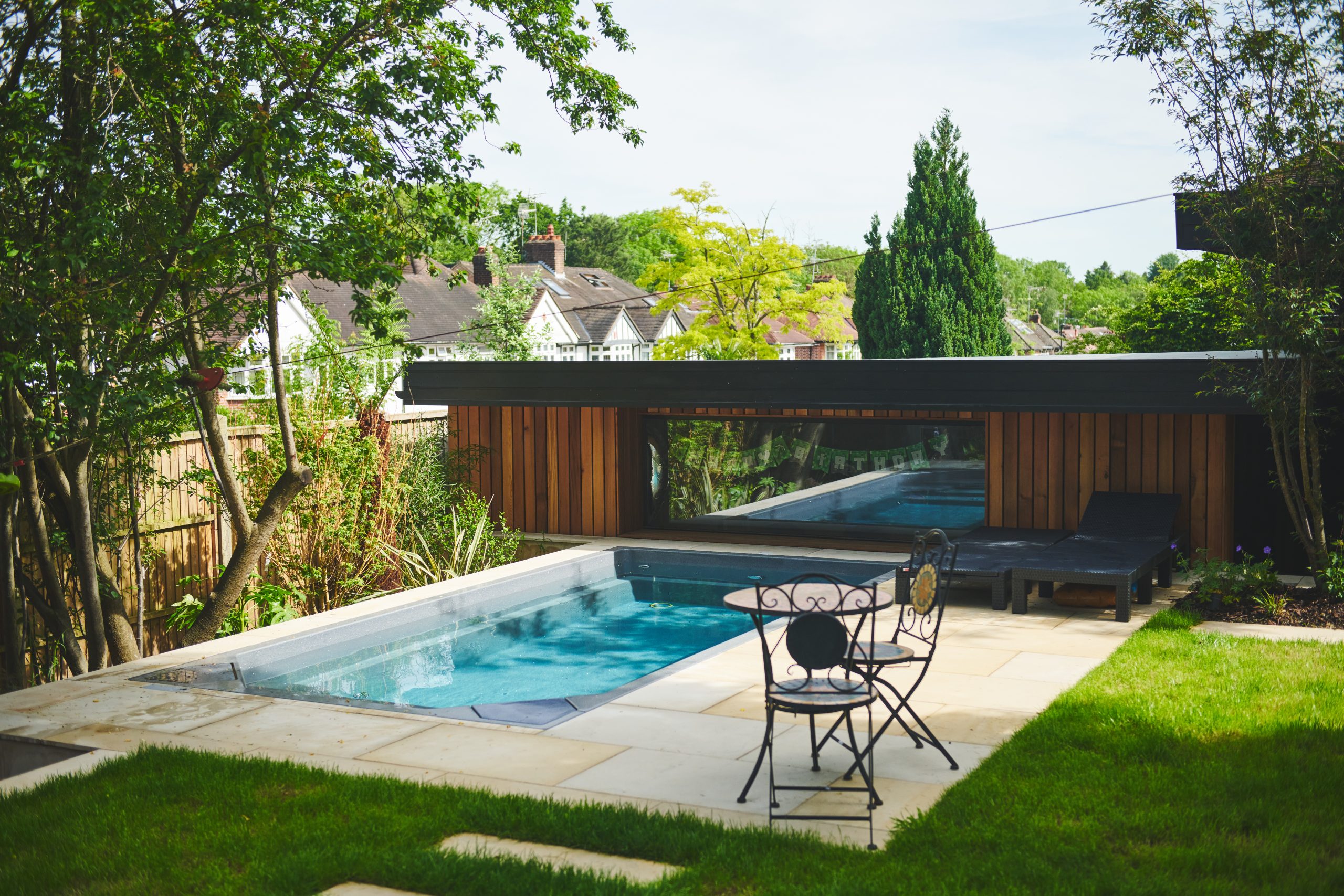
Natural Pools
Natural pools, also known as swimming ponds or bio-pools, use biological filtration systems and aquatic plants instead of traditional chemical treatments to purify and clean the water. These environmentally sustainable pools feature distinct swimming and regeneration zones, where beneficial bacteria and carefully selected plants work together to maintain clean water. The aesthetic appeal of natural pools lies in their organic shapes and materials that create seamless integration with existing landscaping and natural surroundings.
The chemical-free swimming environment provided by natural pools appeals to environmentally conscious homeowners and people who are sensitive to traditional pool chemicals like chlorine. The biological filtration system creates softer water that’s easier on skin, eyes and hair. Environmental sustainability is the main advantage of a natural pool though, as they support local wildlife and biodiversity.
Construction and maintenance of natural pools require specialised knowledge in order to develop effective regeneration zones and biological filtration systems. The larger space requirements for regeneration zones mean natural pools typically need more space than traditional pools, so they’re best suited to larger gardens. If you’re environmentally conscious and want to enhance the landscape of your garden with a cohesive pool, a natural pool is the perfect choice.

Hydrotherapy Pools
Hydrotherapy pools are designed specifically for therapeutic purposes, featuring various water-based treatments and exercise equipment to support rehabilitation, pain management, and wellness programmes. These pools maintain water temperatures typically between 33-36oC, which is warmer than traditional pools but cooler than standard hot tubs, creating optimal conditions for therapeutic exercise and treatment. Jets, underwater massage systems, and resistance equipment can also be integrated into the designs to provide comprehensive therapeutic capabilities.
The therapeutic benefits of hydrotherapy pools make them invaluable for individuals dealing with joint pain, arthritis, muscle injuries, or mobility limitations. The warm water reduces joint stress while improving circulation and flexibility, making exercise and rehabilitation more comfortable and effective than land-based alternatives. The buoyancy of water supports body weight, allowing individuals with mobility challenges to exercise and move more freely than they could on land.
Working with a professional installer is always recommended with this style of pool to ensure the features meet specific user needs and comply with accessibility requirements where applicable. The focus on therapeutic functionality may limit recreational use and aesthetic appeal compared to traditional pool designs, but they’re ideal for anyone with mobility issues or chronic pain conditions, or those interested in professional-quality aquatic rehabilitation and low-impact exercise facilities.

Resistance/Exercise Pools
Resistance pools are engineered specifically for exercise and training. They make use of powerful jets or integrated resistance equipment to allow for swimming and aqua aerobic workouts in compact spaces. These fitness-focused installations prioritise exercise functionality over recreational use, with designs optimised for swimming against resistance currents, underwater treadmills, or other aquatic fitness activities.
The primary advantage of resistance pools lies in their ability to provide excellent cardiovascular and low-impact exercise in a smaller space. The variable resistance levels accommodate users of all fitness levels, from beginners to professional athletes, while the compact design makes them suitable for urban properties or smaller backyards where traditional lap pools wouldn’t fit.
If you’re considering a resistance pool, bear in mind that they can have higher energy costs due to the current generation system, and limited recreational swimming space means these pools might not be ideal for families looking for general entertainment and leisure use. However, they’re perfect for fitness enthusiasts, athletes who need dedicated training facilities, or anyone seeking therapeutic exercise options in space-efficient designs.

Plunge Pools
Plunge pools are small, deep pools designed primarily for cooling off and relaxation rather than swimming laps. They typically measure 4 to 8 feet in width with depths usually ranging from 4 to 6 feet. This creates a compact pool that’s perfect for quick cooling and refreshment. The smaller footprint makes plunge pools suitable for small properties, courtyard settings, or as complementary features to existing outdoor entertainment areas.
The space efficiency of plunge pools makes them perfectly suited to homeowners with limited property space. The lower construction and maintenance costs compared to full-sized pools make them accessible to broader budgets while still providing the benefits of pool ownership. If you have space constraints, just want an area to cool off after exercise or during the summer, or you want to expand your existing pool, a plunge pools is a great addition.

Stainless Steel Pools
Stainless steel pools are made using marine-grade stainless steel panels and structures, offering exceptional durability and modern aesthetic appeal that complements contemporary homes. The smooth, non-porous surface naturally resists algae and bacteria growth, contributing to easier maintenance and better water quality.
The exceptional durability of stainless-steel pools provides longevity that can exceed 50 years with proper maintenance, making them excellent long-term investments despite higher initial costs. The smooth surface is easy to clean and maintain while requiring fewer chemicals for water treatment due to its non-porous properties. Steel also possesses excellent thermal properties, making them easier to heat.
Professional installation is essential to ensure the panels are properly aligned and sealed to ensure long-term performance. This style of pool is ideal for homeowners looking for long-term durability, modern aesthetics, or installations in harsh conditions where traditional materials might deteriorate more rapidly.

Moveable Floor Pools
Moveable floor pools incorporate sophisticated hydraulic or mechanical floor systems that can adjust water depth or completely cover the pool area when not in use, creating versatile spaces that serve multiple functions. The capabilities of moveable floor pools make them invaluable in environments where space is at a premium, and multiple functions are required from a single area. They’re also perfect for families as they allow for the option to create shallow areas for children or non-swimmers while maintaining deep water capability for serious swimming and diving.
The complexity and cost of designing and installing moveable floor systems result in significant considerations for potential owners. These pools come with much higher upfront costs because of the sophisticated engineering, precision manufacturing, and specialised installation that’s required, while complex mechanical systems require specialised maintenance knowledge and regular servicing. However, for high-end, luxury homes and spaces where you want the utmost flexibility, moveable floor pools deliver impressive functionality that justifies the investment.

Inground Pools
Inground pools are one of the most popular and traditional approaches to swimming pools, constructed by excavating below ground level and building the pool structure as an integral part of the property’s landscape. Inground pools are versatile and come in a range of materials, from concrete and fibreglass to vinyl liner construction methods, each offering different advantages in terms of customisation, durability and cost. The below-ground installation provides better integration with landscaping designs while offering more stable water temperatures due to the natural ground insulation.
The permanent nature of inground pools creates lasting additions that typically increase property values significantly, making them worthwhile investments for homeowners planning long-term residence. Highly customisable design options also allow for an unlimited array of shapes, sizes, depths, and features to match your specific property requirements and personal preferences.
Significant excavation and construction work might disrupt existing landscaping and require temporary access arrangements for heavy equipment, so homeowners should consider this before embarking on an inground pool design. The permanent location also can’t be easily changed once installed, so initial site selection and design decisions are critical.

Infinity Pools
The ultimate in luxury, infinity pools, also known as vanishing edge or negative edge pools, create stunning visual effects by allowing water to flow over one or more edges into hidden catch basins, producing the illusion that the pool water extends infinitely. They’re sophisticated installations that require sloped terrain or an elevated position to achieve full dramatic visual impact, and are combined with complex engineering for to recirculate the water and maintain proper water levels and flow rates.
Construction and operational costs reflect the sophisticated engineering and specific site requirements necessary for a successful infinity pool installation. Specific site conditions are also required, such as adequate slope, proper drainage, and professional engineering to ensure stable operation, so they may not be possible in all homes. Infinity pools are well-suited to luxury homes and scenic properties, where you may want to add a unique focal point for full visual impact and entertainment value.

Lap Pools
Lap pools are engineered for exercise, featuring long, narrow dimensions that make the most of available space while minimising construction costs and ongoing operational expenses. Lap pools typically measure between 40 to 75 feet in length and 8 to 10 feet in width, with consistent depths throughout the pool to provide optimal swimming conditions. Minimal decorative features maximise the available swimming space while optional accessories like pace clocks and lane markers can help to support serious training routines.
The space-efficient design of a lap pool works well in narrower properties where traditional pool shapes aren’t a good fit. Since they’re more simplistic in their design, they do tend to come with lower construction costs, and reduced heating and chemical costs are another benefit from smaller surface areas.
The utilitarian design might not provide the aesthetic appeal that some homeowners seek from pool installations, and heating could be necessary for comfortable year-round exercise in cooler climates, adding to operational costs. If you’re a serious swimmers or fitness enthusiasts who wants to focus on exercise capability over recreational features, or you want cost-effective swimming facilities with minimal maintenance requirements, lap pools are well-suited to your needs.

Saltwater Pools
Saltwater pools use salt chlorine generator systems to produce chlorine from dissolved salt, providing an alternative to traditional chemical chlorination that results in gentler water conditions and a reduced need for chemical handling. Saltwater systems maintain salt levels typically between 2,500 and 4,000 parts per million, roughly one-tenth the salinity of ocean water, while specialised equipment converts the salt to chlorine through electrolytic processes.
Understanding salt system maintenance is essential for proper operation of your pool, including periodic cleaning of generator cells and monitoring the salt levels. While salt systems reduce chemical handling, they still require monitoring and occasional chemical adjustments for proper water balance. Saltwater pools are ideal for individuals who are sensitive to traditional pool chemicals, environmentally conscious homeowners who want to reduce their dependence on pool chemicals, or anyone desiring a more natural swimming experience with gentler water conditions.

Garden Pools
Garden pools are decorative pool installations designed to serve as both functional features and integral components of your landscape design. These beautiful pools often feature organic shapes that complement natural garden aesthetics rather than dominating outdoor spaces. Incorporating natural materials such as stone, tile and integrated plantings can also help to create a seamless transition between the pool and surrounding garden elements.
Careful integration with garden irrigation systems is necessary with a garden pool to prevent conflicts between pool chemistry and the health of your plants. Seasonal limitations in colder climates could also restrict year-round enjoyment, despite the smaller size that could theoretically be heated more economically. However, the aesthetic integration capabilities of garden pools make them valuable additions to beautifully landscaped properties where the pool serves as both functional and decorative elements. They’re also well-suited to smaller properties and more modest budgets, and the intimate, private swimming experience appeals to anyone seeking peaceful retreats rather than entertainment venues.

One-Piece Pools
One-piece pools are pre-manufactured as complete units in a factory, usually from fibreglass or other composite materials, and then transported and installed as single structures rather than being built on-site. One-piece pools feature smooth gel-coat surfaces that naturally resist algae growth and come in a range of standard shapes and sizes. With manufacturing taking place in a controlled setting ensures consistent quality and construction standards that can be difficult to achieve with on-site construction methods.
The installation speed of one-piece pools provides significant advantages, with typical installation timelines of 1 to 3 days compared to weeks or months required for custom concrete construction. Lower labour costs result from simplified installation procedures that require less skill and shorter project timelines, and the great insulation properties of fibreglass help maintain water temperatures more efficiently than some alternative materials.
Since one-piece pools are manufactured in factories, there are less customisation options compared to other pool types, which might not be ideal for homeowners looking for a unique shape or specific design features. However, one-piece pools are well-suited to those looking for quicker installation and tried-and-tested designs that will enhance your home.

DIY Fibreglass Pools
DIY fibreglass pools consist of pre-manufactured pool shells designed specifically for self-installation by homeowners with adequate skills, time, and determination to complete the complex installation process. These comprehensive kits include detailed instructions, all the necessary hardware, and support materials to guide homeowners through excavation, positioning, plumbing, electrical work, and backfilling procedures. While the pool shell quality matches professionally installed alternatives, the installation process requires significant planning, preparation, and execution to achieve successful results.
Smooth, durable fibreglass surfaces provide easy maintenance and chemical efficiency regardless of your installation method, and they can provide faster installation timelines compared to concrete alternatives which allows motivated DIYers to complete projects more quickly than traditional construction methods. DIY fibreglass pools are best suited for experienced DIY enthusiasts with the necessary time, skills, and physical capability, or homeowners who are looking to save money on their pool installation. While a challenging project, it also offers the satisfaction of completing a major construction task.
Installation challenges and risks that come with this style of pool include the ability to manage heavy materials and complex procedures, and the knowledge to install the pool without errors as these can be challenging to correct once the pool is in place. Excavation and utility work can still require professional contractors due to safety concerns and local regulations, reducing some of the potential cost savings. Permitting and inspection requirements still apply to DIY installations, so ensure you’re compliant with local building codes and safety regulations.

Ceramic Swimming Pools
Ceramic swimming pools feature high-quality ceramic tiles or coatings that provide exceptional durability, aesthetic flexibility, and maintenance advantages over alternative materials. These premium installations offer unlimited design possibilities through countless colour, pattern, texture, and size combinations, and the non-porous properties resist staining and algae growth while still providing easy cleaning and maintenance.
The durability advantages of ceramic pool finishes provide exceptional longevity that can last decades with proper installation and maintenance, making them worthwhile investments. Ceramic pools are also resistant to chemical damage and UV fading, so they’ll maintain their appearance over time. Stunning visual effects can be achieved through creative patterns, colour gradations, and lighting features that transform your pool into a true focal point.
Professional installation is essential for the long-term performance of ceramic swimming pool installations. Ceramic swimming pools are ideal for property owners looking for a high-end pool, unlimited design possibilities, durability and easy maintenance, and who want to create a custom design for their swimming pool.

Luxury Pools
Luxury pools represent the pinnacle of swimming pool design and construction, combining premium materials, advanced technology, and custom design elements to create exceptional spaces. Luxury pools are designed with the finest materials such as natural stone, exotic tiles, precious metal accents, and cutting-edge equipment to create swimming experiences, while advanced automation and control systems provide convenience and unique features such as ambient lighting, water effects, temperature control, and entertainment systems.
The aesthetic appeal of luxury pools creates unique features that significantly distinguish properties. State-of-the-art technology, from automated chemical management, to smartphone controls and integrated entertainment capabilities all enhance usability and enjoyment, making these pools perfect for entertaining and relaxing.
Because of the premium materials, custom designs and advanced equipment, luxury pools are naturally more expensive to install, but if you want a truly unique pool and high-end features, a luxury pool is perfect. Homeowners who want to add value to their property or want resort-quality amenities in their own home will find this style of pool ideal.

Basement Pools
Basement pools are constructed in existing basement areas or purpose-built underground spaces to create climate-controlled environments with maximum privacy and year-round functionality. These unique pools require extensive engineering for structural support, waterproofing, ventilation, and moisture control to ensure safe, comfortable operation within this unique environment. Lower ceiling heights compared to traditional indoor pools create more intimate swimming environments but can limit some activities like diving.
The privacy and security benefits of basement pools provide unmatched seclusion for swimming and relaxation activities while eliminating concerns about outdoor visibility or weather conditions. It’s also an effective use of existing basement spaces that might otherwise go to waste, leaving your garden untouched while still providing a pool you and your family can enjoy. Unique architectural opportunities allow creative designs that can complement interiors and create stunning underground retreats.
Construction and operational challenges include significant structural and waterproofing requirements to address moisture issues, which means complex ventilation systems are essential to manage humidity and ensure adequate air quality. If you already have a suitable basement space or you want to add a unique feature to your home that you can use year-round, a basement pool may be perfect for you.

Commercial Pools
Commercial pools are large-capacity installations designed for public or semi-public use in facilities such as hotels, community centres, schools and gyms or fitness clubs. These heavy-duty installations accommodate multiple users thanks to larger dimensions, advanced filtration and sanitation systems, and durable construction materials that are designed to withstand constant use. Strict compliance with health and safety regulations ensures public safety while professional maintenance and monitoring maintain water quality and facility cleanliness.
The high-capacity water treatment systems of commercial pools handle much larger numbers of users at any one time compared to residential installations, combining powerful filtration, circulation, and chemical treatment systems that maintain the quality of the water even during heavy use. Durable construction materials and finishes also withstand constant use, chemical exposure, and cleaning procedures required for public facilities.
There are a few considerations that are unique to commercial pools. First, professional maintenance and monitoring is necessary to ensure consistent water quality, safety compliance, and facility cleanliness. Safety features and accessibility compliance must also meet strict regulatory requirements for public facilities, including appropriate fencing, emergency equipment, and accommodation for disabled users.

Small Pools
Small pools are designed for properties with limited space or budgets. Space-efficient in their design, small pools focus on basic swimming and cooling functions over extensive recreational features, using simple rectangular or circular shapes and basic filtration and heating systems. This provides essential functionality while minimising complexity and operational costs.
The lower initial construction costs of small pools make swimming pool ownership accessible to homeowners with more limited budgets or those seeking basic features without substantial financial investment. Faster heating and chemical treatment capabilities allow for easier temperature control and water quality management compared to larger installations too. If you have a smaller garden or just want an area to relax and cool off rather than exercise or entertain, a smaller pool may be perfect for you.
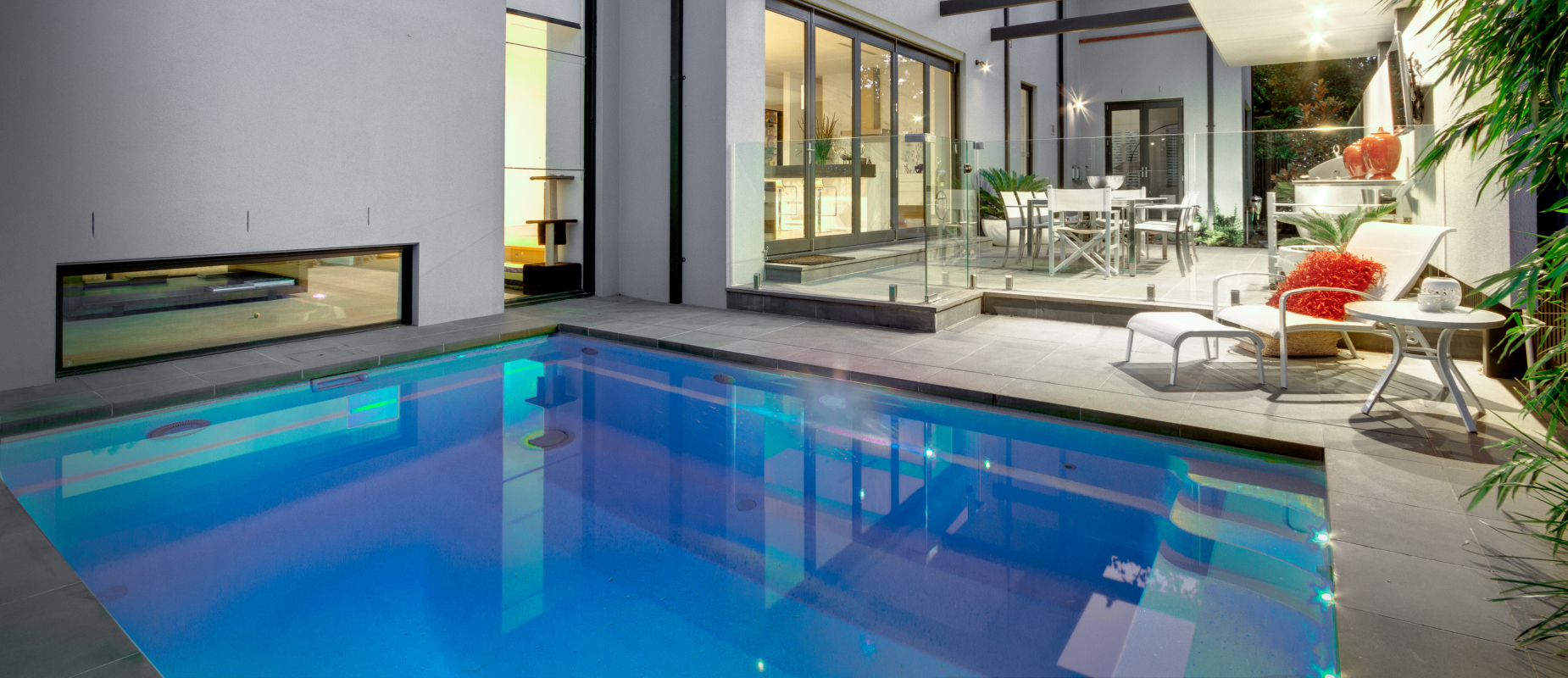
Fastlane® system by Endless Pools®
FastLane pools use powerful resistance systems that generate substantial water flow, allowing users to swim stationary against adjustable currents in compact pool designs that are optimised for exercise. FastLane pools feature variable speed controls that can accommodate different skill levels and training intensities and often include spa or hot tub features for relaxation too.
The compact design maximises space, making them suitable for properties where traditional lap pools wouldn’t fit. The lower space requirements of this style of pool means they’re possible for urban properties, smaller gardens, or indoor installations where full-length swimming pools aren’t possible. Professional installation is recommended due to the complexity of the internal systems and electrical requirements of a FastLane pool. This type of pool is ideal for fitness enthusiasts with limited space who want to prioritise exercise over recreation and relaxation.
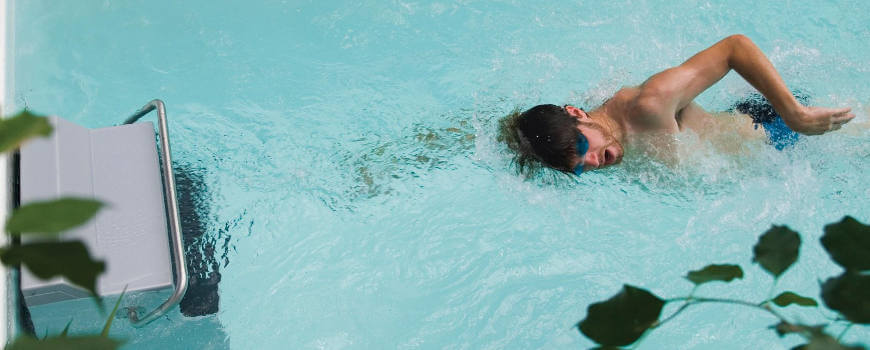
Get in Touch
At Compass Pools, we pride ourselves on designing bespoke pools that work for you and your lifestyle. From a range of sizes and shapes to custom features that make your swimming pool truly your own, we can tailor our designs to meet your needs. Contact us today for a quote and to start the design process.
Written By: Alex Kemsley













